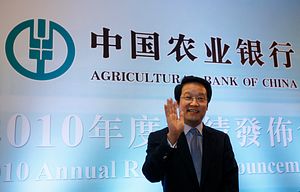On June 14, Xiang Junbo, former chairman of the China Insurance Regulatory Commission (CIRC), pleaded guilty to taking bribes worth over 19.4 million yuan ($3.03 million) during his trial at the Changzhou Intermediate People’s Court of Jiangsu Province, according to China’s state news agency, Xinhua.
According to his resume, Xiang had broad and profound experience as a regulator in China’s financial sector. With a professional background in China’s National Audit Office, he was transferred to Chinese central bank, the People’s Bank of China (PBC), in 2014 as a deputy governor. In 2007, he was assigned to manage the Agricultural Bank of China (ABC), one of the big four state-owned commercial banks. Under his charge, the ABC went public in mid-2010 in both the Shanghai and Hong Kong stock exchanges. In October 2011, Xiang was named CIRC chairman — the ruler of China’s booming insurance market.
In its short report, Xinhua revealed that between 2005 and 2017 — which covers Xiang’s whole working experience with PBC, ABC, and CIRC — Xiang had helped various organizations and individuals with “project contracting, case handling, loan issuance, qualification reviews, and personnel promotion.”
“In return, he accepted money or gifts worth over 19.4 million yuan ($3.03 million) directly or through his associate Yang Guang, whom the indictment described as a ‘person of specific relation.’” Xinhua added.
Xinhua didn’t elaborate on this “person of specific relation.” But according to The Economic Observer, Yang is actually Xiang’s wife, and the couple had divorced once and married again later. Based on current public information, it’s still unclear whether their turbulent marriage has anything to do with Xiang’s bribery.
Xinhua said that Xiang “pleaded guilty and expressed repentance” in his final statement.
So far no video footage of Xiang has been released, and Xinhua’s report has been the only account of his trial, although Xinhua claimed that “more than 60 people, including national and local lawmakers, political advisers, journalists, and members of the public, attended the trial.”
It’s particularly worth mentioning that in September 2017, the Central Commission for Discipline Inspection (CCDI), the highest internal-control institution of the Chinese Communist Party (CCP), had published a statement detailing Xiang’s misconducts.
According to the CCDI, Xiang’s top misconduct, among many others, was that he had “committed serious violations of political discipline and rules.”
These serious violations included “seeking personal political interests,” “fighting against organizational review,” “engaging in superstitious activities,” and “trading power for money and sex.” Thus, CCP authorities had decided to expel Xiang from the Party.
On the same day of Xiang’s trial, CCDI released a commentary on its website vowing to maintain high pressure on corruption.
This commentary said: “The current situation of anti-corruption struggle is still grim and complicated. Problems including the combination of political and economic issues, the intertwinement of the regional and sectoral corruption … are particularly prominent” — seemingly referring to Xiang’s case.
With a serious attitude, the CCP will keep “beating tigers” (meaning high-ranking leaders), “swatting flies” (lowly bureaucrats), and “hunting foxes” (shrewd economic criminals), the commentary concluded.
Yet a number of Chinese netizens pointed out that the latest trial showed that the total amount of bribes Xiang took is far less shocking compared to that of many other corrupt Chinese officials. Based on The Paper’s report, there has been a laundry list of corrupt officials convicted of taking bribes worth over 100 million yuan ($15.6 million).

































